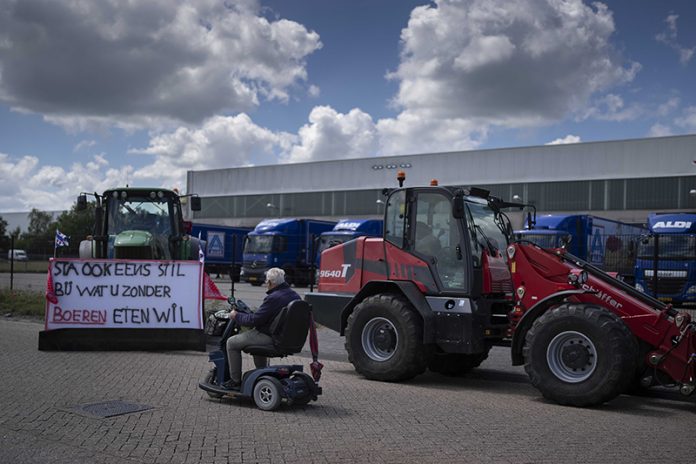
By PETER DEJONG
Associated Press
ZAANDAM, Netherlands (AP) — Dutch farmers angry at government plans to slash emissions used tractors and trucks Monday to block roads and supermarket distribution centers, sparking fears of store food shortages in the latest actions through a summer of discontent in the country’s lucrative agricultural sector.
The Netherlands’ busiest aviation hub, Schiphol Airport, urged travelers to use public transport to get to its terminals amid fears that the blockades also would target airports. Fishermen acting out of solidarity with farmers also blocked a number of harbors.
The unrest among Dutch farmers was triggered by a government proposal to slash emissions of pollutants like nitrogen oxide and ammonia by 50% by 2030. Provincial governments have been given a year to formulate plans to achieve the goal.
A group of farmers in the province of North Holland held talks with two senior officials in the city of Haarlem.
“Their concerns are understood and have our absolute attention. Good to be and stay in conversation with each other,” tweeted one of the officials, Arthur van Dijk.
Dozens more parked their tractors on a bridge over a canal, forcing freight barges to moor up on either side because the bridge could not open to let them pass.
The reforms are expected to include reducing livestock and buying up some farms whose animals produce large amounts of ammonia. Farmers argue they are being unfairly targeted and are being given no perspective for their future.
Police looked on but did not immediately take action Monday as some 25 tractors parked outside a distribution center for supermarket chain Albert Heijn in the town of Zaandam, just north of Amsterdam. Placards and banners affixed to the tractors read messages including, “Our farmers, our future.”
A tractor at another protest, in the northern town of Drachten, urged people to “think for a moment about what you want to eat without farmers.”
The umbrella organization for supermarkets called on police to take action and warned of possible shortages on supermarket shelves.
“Blockades of distribution centers hurt the citizens of the Netherlands. Supermarkets do everything they can to keep the stores stocked, but if blockades continue, it could lead to people not being able to do their daily shopping,” the Central Bureau for Food Trade said in a statement.
Traffic authorities warned motorists to prepare for delays and possible slow-moving tractors on the nation’s highways, but said that there were few problems early Monday for commuters, possibly because many people opted to work from home rather than get stuck in traffic.
Over the weekend, the government appointed an intermediary to lead talks between farmers’ organizations and officials drawing up pollution reduction measures. However, Prime Minister Mark Rutte has ruled out negotiating with farmers responsible for radical protests.
Mainstream farming lobby group LTO described the mediator, Johan Remkes, as “an administrative heavyweight with deep knowledge” of the issues and said it was open to talks with him.
According to LTO, there are nearly 54,000 agricultural businesses in the Netherlands with exports totaling 94.5 billion euros in 2019.



















